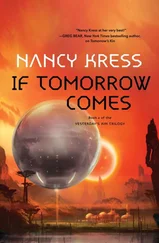“Okay.” He sounded disappointed. “Will we still get to watch Big Bang Theory ?”
“Sure. And one more thing—”
“All right.”
“Don’t mention this to anyone, okay?”
“Why not?”
“I’d just as soon nobody knows until I actually find one.”
• • • •
We both had offices at home. A couple of nights after the party, when I had some free time, I went into mine, sat down, and started digging through the online sky surveys. Even though I’d devoted my entire career to cosmology, I was probably uniquely qualified to look for comets because I had exactly the right tools. I’d developed software that could analyze for mass, gravitation, dark matter distribution, distance, velocities, and so on. Normally, my research consisted of recording a set of results from the digital archives, moving forward a given number of years, analyzing how the situation had changed, and comparing the results with what I’d anticipated.
The same approach should work in the hunt for comets. Comets originate in the outer solar system, either in the Kuiper Belt—which consists of small bodies of ice, rock, and metal orbiting beyond Neptune and extending for an additional two billion miles—or in the Oort Cloud, which lies at a range of about a light-year. The Kuiper Belt offered a much better chance of success. So I locked in on it.
Warren never quite understood why I was so hung up on gaining visibility in the field. He was a realtor, but he knew there was more to life than making money. He enjoyed being able to see his clients settle happily into homes, or to assist them when they were moving elsewhere. He thought those were the only two things that really counted in one’s profession: making a contribution, and collecting a decent income. “Nobody other than my clients and family, and a few friends,” he’d told me once, “will ever know my name. But what does that matter?”
Why did I want to put myself out front with a theorem that would never matter to anyone? Or probably even be understood by anybody except a few specialists? He’d tried reading Quantum Theory for Dummies , and realized that even physicists didn’t really grasp the reality of some of the more arcane mathematics.
I sat quietly through the night, looking at patches of sky, discarding stars, picking up glimmers that were too faint to amount to anything. Eventually my eyes got heavy and I resigned myself to the fact that I would not amount to anything… at least not tonight.
• • • •
Two nights later I repeated the process with the same result. But I stayed with it, whenever I had time. Warren thought it was a waste of effort but he didn’t say so directly. He did mention that real estate was booming, and that he could use another agent. He guaranteed I’d earn a lot more than I was making as a college professor. He mentioned an article about how people who keep irregular hours damage their brains. And he left a magazine open on the table with a story about how marriages work better when the partners spend time together.
Then, one night about six months after I’d started, the numbers coalesced and I realized I’d found what I was looking for. An object on the inner edge of the Kuiper Belt had dropped out of its orbit, probably influenced by the passage of Neptune, and was moving toward the sun. The spectroscopic analysis indicated it was 3.1 billion miles away.
Beautiful.
Warren was watching a hockey game and Liz was in the kitchen when I came out of my office. “Are you quitting for the night?” he asked. “It’s early.”
I looked casually at my watch. “I guess it is a bit early.”
He froze the picture. “Why the smug smile? Did you find something?” I didn’t have to say a word. “Congratulations. How big is it?”
“The diameter’s about twenty-five kilometers.”
“That sounds good. When will we see it?”
“Warren, I don’t know how much visibility it will have. And I haven’t really run the numbers yet, but I’d guess it’ll be in the vicinity of Earth in about twenty years.”
“So we’ll be in our fifties.”
“Hard to believe, isn’t it?”
He broke into a grin. “I certainly married a woman with vision.”
• • • •
When the news broke about the comet, I became a local celebrity and the university got a nice PR boost as a result. Reporters descended, and I appeared on several TV shows and on The Science Channel. It was a gloriously happy time.
The data were made available to the world, and confirmed by everyone. Tom called me into his office. “I was surprised that you’ve gotten involved with comets.”
“It became something of a hobby.”
“I hope it hasn’t been affecting your research?”
“No, Tom. I wouldn’t let that happen. I was just taking an occasional break.”
“Okay. Nothing wrong with that.” He glanced up at the dictum that, he claimed, ruled his life: Enjoy the moment. We don’t have forever . It was framed and hung on the wall beside a picture of him and the governor. The reality was that I’d never known anyone more committed to the task at hand, and less likely to take time off. “You know you have naming rights?”
“I had no idea.” I tried not to smile.
“Well, you might want to give it some thought.”
I knew what I wanted to call it, of course. But I had no wish to sound like an egomaniac. I’d gotten to know him pretty well over the years, so I decided to give him a chance to open a door for me. “Tom,” I said, “if you’d discovered one of these things, what would you call it?”
“The tradition is that it should become Gibson’s Comet.”
“I could live with that.”
• • • •
I don’t know that anyone became prouder of Gibson’s Comet than Liz. But she was disappointed that the image on her computer screen was barely visible. “I thought comets were bright,” she said. “Where’s its tail?”
“It won’t have one until it gets closer to the sun.”
“When will that happen?” she asked.
“It’ll be a while,” I said.
Warren was happy for me, and gradually over the next few weeks, everything went back to normal. One evening while we were watching a Seinfeld rerun, I got a call from a woman who identified herself as an astronomer working at the Mauna Kea observatory in Hawaii. “ Maryam ,” she said, “ something odd’s happening .”
I couldn’t imagine why she would be calling me. “What’s that?” I asked.
“ We have two more comets coming in. From the same general location as yours. I’ll forward the data if you like .”
That was not good news. I wasn’t excited at getting competition. But when I saw Tom at the university next morning and mentioned it, he’d already heard.
“Something’s happening out there,” he said.
• • • •
Our local TV station, WKLS, hit a slow news period and asked me to answer some on-camera questions. The show’s moderator was Judy Black, who specialized in doing inspirational, uplifting pieces. “Dr. Gibson,” she said, “have we ever had three comets in the sky at the same time before?”
“Well,” I said, “they’re all a long way off, so I wouldn’t exactly characterize them as ‘in the sky.’ But, yes, that’s certainly unusual.”
“Can you explain why it’s happening?”
“Judy, we think there’s been a gravitational change of some sort. We’re still looking for a reason.”
Her eyebrows rose. “What could cause such a change?”
“A lot of things, really. It can happen, for example, if one of the big planets gets a bit close to an object in the Kuiper Belt. That’s what pulls the comets out of the Belt and sends them in our direction.”
Читать дальше












